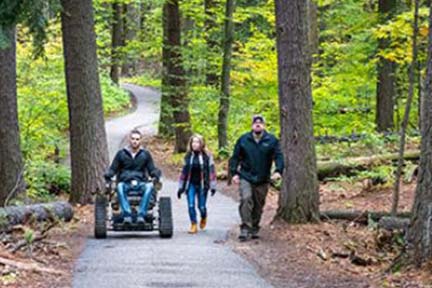
DNR News Digest – Week of July 8, 2024
|
|||||||||||||||
|
|||||||||||||||
News Digest – Week of July 8, 2024
Enjoy yoga and mindfulness at Belle Isle Park, just one option on the DNR events calendar! |
|||||||||||||||
|

|
|||||||||||||||
|
|||||||||||||||
News Digest – Week of July 8, 2024
Enjoy yoga and mindfulness at Belle Isle Park, just one option on the DNR events calendar! |
|||||||||||||||
|

 |
| FOR IMMEDIATE RELEASE July 9, 2024 |
MEDIA CONTACT Dan Weingarten 906-250-4809 WeingartenD@Michigan.gov |
Fast facts:
LANSING, Mich. - Motorists should be on the lookout beginning Saturday as Adopt-A-Highway volunteers fan out across the state picking up litter. Participants in the Michigan Department of Transportation (MDOT) program will clean highway roadsides from July 13 to 21 during the second of three scheduled pickups this year.
The popular Adopt-A-Highway program began in Michigan in 1990 and has grown to involve more than 2,900 groups cleaning more than 6,000 miles of highway. Every year, volunteers regularly collect more than 60,000 bags of trash.
Getting involved in Adopt-A-Highway is straightforward. Volunteers include members of civic groups, businesses and families. Crew members have to be at least 12 years old and each group must include at least three people. Groups are asked to adopt a section of highway for at least two years. There is no fee to participate. Adopt-A-Highway signs bearing group names are posted along the stretches of adopted highway.
When working in a highway right of way, Adopt-A-Highway volunteers wear high-visibility, yellow-green safety vests required by federal regulations. MDOT provides free vests and trash bags, and arranges to haul away the trash.
Sections of highway are available for adoption all over the state. Interested groups can get more information on joining the program at www.Michigan.gov/AdoptAHighway
The year’s final Adopt-A-Highway pickup is scheduled for the fall, from Sept. 21 to 29.


FOR IMMEDIATE RELEASE July 9, 2024 Contact: press@michigan.gov
Gov. Whitmer Secures Tuition-Free Community College for Michigan High School Graduates for the Upcoming School Year New education budget delivers on the Michigan Guarantee, gets Michigan closer to Sixty by 30 goal
LANSING, Mich.—Today, Governor Whitmer highlighted the new school aid budget, which delivers on the Michigan Guarantee so every high school graduate can earn an associate’s degree or skills certificate from an in-district community college tuition-free, saving more than 18,000 students up to $4,800 a year.
“I’m proud of our work to lower the cost of higher education and put college or skills training in reach for more working Michigan families,” said Governor Whitmer. “This education budget goes even further, delivering on our Michigan Guarantee to ensure every Michigan high school graduate can earn an associate degree or skills certificate tuition-free at their community college. Across our state more Michiganders are going back to school and getting the skills they need for high-skilled, better-paying jobs. We’ll keep working to lower barriers to economic prosperity and help more families ‘make it’ in Michigan.”
“Education is our greatest engine for economic and personal advancement,” said Lt. Governor Garlin Gilchrist II. “Thanks to the Michigan Achievement Scholarship and Michigan Reconnect, countless Michiganders across our state have been able to chase their dreams of a good-paying job, a college education or skills training, and a better life. This education budget delivers on the Michigan Guarantee, making two years of community college or skills training an achievable goal for more Michigan families. We are grateful for the partnership that got this done and we will continue lowering barriers to health and wealth for Michiganders.”
The Michigan Guarantee In her 2024 State of the State Address, the governor laid out her vision to improve education in Michigan. The governor proposed the Michigan Guarantee, so every Michigander can have access to quality education from pre-K through community college.
Making the first two years of community college tuition-free for high school graduates will save more than 18,000 students up to $4,820 as they earn an associate’s degree or skills certificate at a community college, helping them land a better-paying, high-skill job in a career field they are passionate about.
Governor Whitmer’s Record, Bipartisan Investments in Education Delivering on the Michigan Guarantee builds on historic investments in education in the FY25 budget and throughout Governor Whitmer’s administration. The recently passed budget includes the largest investment in schools in our state’s history, with $598 million in ongoing payments to school districts across the state, equivalent to a 4% increase in the per-pupil foundation allowance; hundreds of millions to continue historic investments for student mental health and school safety; more investments in literacy and free school breakfast and lunch.
The governor set the Sixty by 30 Goal to have at least 60% of Michiganders earn a degree or skill certificate by 2030 and created the Office of Sixty by 30 to lead the state’s effort. Governor Whitmer also lowered the age of Michigan Reconnect from 25 to 21, offering Michigander’s tuition-free associate degree or skills certificate in high-demand careers. |

Press Release FOR IMMEDIATE RELEASE: July 3, 2024 CONTACT: Chelsea Wuth, 517-241-2112, WuthC@michigan.gov Nearly 900,000 Michigan children to receive LANSING, Mich. – To help ensure children are able to access healthy food this summer while school is out, eligible families will soon receive $120 per child through the Michigan Department of Health and Human Services’ (MDHHS) new Michigan Summer Electronic Benefit Transfer (EBT) program. The U.S. Department of Agriculture’s (USDA) Food and Nutrition Service has approved Michigan’s plan for the Summer EBT program to help low-income families feed children over the summer months. Created by the U.S. Congress, the Summer EBT program is based on similar efforts used during the coronavirus pandemic to address food insecurity for students. MDHHS and the Michigan Department of Education (MDE) are working together to get these benefits to families across the state. Funds are being distributed ahead of the Friday, July 19 start date cited in the state’s plan. “Summer should be a time when children can learn, grow and play without worrying about where their next meal will come from,” said Sen. Debbie Stabenow (D-MI). “I’m so proud that the Governor and the State Legislature have acted to make sure every Michigan child has access to healthy meals during the school year. My legislative victory is focused on making sure children have the same access to healthy meals in the summer regardless of where they live in Michigan. This is bringing us one step closer to ending childhood hunger.” “Many Michigan children rely on breakfast and lunch provided at their school during the school year and we want to make sure they do not go hungry this summer while schools are on break,” said Elizabeth Hertel, MDHHS director. “The Summer EBT program increases family’s grocery-buying budgets and we are thrilled to get this funding out earlier than planned. We plan to get these benefits out even earlier next year.” Benefits will come in the form of EBT cards that families can use to buy groceries. Families who already have a Bridge card will have a one-time payment of $120 per eligible child, the standard benefit amount set by the USDA for the 2024 program year, added to their existing card. Those who don’t already have a card will be sent a pre-loaded card in the mail. Eligible families will receive a letter about the program. “Providing nutritious meals to Michigan children – during the school year and during the summer – helps meet Goal 3 of Michigan’s Top 10 Strategic Education Plan, to improve the health, safety and wellness of all learners,” said State Superintendent Dr. Michael F. Rice. “We need to support children nutritionally in the summer as we do in the school year, and this partnership with the U.S. Department of Agriculture and MDHHS helps children and families.” Most families eligible for these benefits will receive them automatically thanks to state agencies collaborating to identify kids who qualify based on their participation in other benefit programs, including the Supplemental Nutrition Assistance Program or the free or reduced-price meal programs at their school. A child is eligible for Summer EBT if they are:
Additional programs designed to feed children during the summer months include the MDE-administered program like the Summer Food Service Program, also known as Meet Up and Eat Up in Michigan, and the Rural Non-Congregate Summer Food Service Program. For more information, visit the Summer EBT page on the MDHHS website. |


FOR IMMEDIATE RELEASE
July 3, 2024 Contact: press@michigan.gov
Gov. Whitmer, Legislature to Put Money Back in Teachers’ Pockets in Budget Recently passed FY 2025 budget supports educators with increase in pay for veteran teachers, continued student loan repayment, future educator fellowship, and stipends for student teachers
LANSING, Mich. – Governor Whitmer highlighted investments in the recently passed state budget to support educators—past, present, and future.
“This year’s budget will build on our historic efforts to invest in educators and ensure they have the resources they need to succeed,” said Governor Whitmer. “By raising pay, reducing debt, and supporting future teachers we are setting up Michigan schools for decades of success. Together, we will train, attract, and retain more skilled, talented educators to our schools, building on the historic investments we have made since I took office. I will always have our educators’ backs, and I look forward to continuing this work with my partners in the legislature and across Michigan.”
“Supporting our educators is one of the most important things we can do to ensure a brighter future for Michigan,” said Lieutenant Governor Garlin Gilchrist II. “As a dad of three school-aged kids, I want them all to go to a classroom where they are taught by a skilled, qualified educator. This budget not only recognizes the hard work of our current teachers but also paves the way for the next generation of educators by making it more affordable to enter the profession. We are committed to creating an environment where educators can thrive and where every student has the opportunity to succeed.”
“We applaud Gov. Whitmer and Legislature’s fiscal responsibility in aggressively pre-funding the school employee retiree health system,” said Michigan Education Association President and CEO Chandra Madafferi, a teacher from Oakland County. “Now that the system is fully funded, educators from across Michigan — who have sacrificed 3% of their salaries for over a decade to shore up the retirement system — will receive much-needed financial relief, and local schools will receive a boost in per-pupil funding to help our students learn.”
A Better, More Affordable Education Governor Whitmer remains a steadfast ally for students and teachers in Michigan’s school system. This budget marks the largest investment in education in our state’s history for the sixth year in a row. These investments include:
|